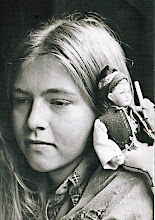For whatever reason, this handwriting was taught in German schools between 1915 and 1941. Thank God it wasn't longer. There are numerous problems in deciphering this handwriting, but the main ones are that so many letters look alike and that the upper case and lower case of the same letter often look very different. If I want to read these postcards, I am going to have to learn to decipher the handwriting.
Here is my name (Christine) written in Sütterlin (and that's if it's written neatly):
It kind of makes sense if you already know what it's supposed to be, even though the letter E looks very much like the letter N. The letter C is one of the oddest, in my opinion. Here is lowercase C and capital C:
And then there are several different versions of the letter s
Anyway, I'm determined to learn it, because otherwise I will be unable to read the backs of these cards--and there are lots of them.
This one, luckily, is fairly simple.
The front of the cards says Merry Christmas. The message on the back continues with the message:
wishes you with all his (her) heart,
Your F. Auf Wiedersehen























It may have been longer. I know my mom said she was taught this method first, and that her class was one of the last that learned it. She was born in 1939. As I type this I realize she could have been taught it at home since the war interrupted school for so long.
ReplyDeleteI know exactly what you mean, when I try to understand some of the writing in my mother's family albums....it has made it hard to even comment on what is said on the back, or underneath the photo.... Of course once I started to learn German that was long gone.... It would amaze me too when my mother's relatives would gather and begin talking about our day and how it often sounded like (I hate to say this but it's the honest truth) their conversations sounded very heated!!
ReplyDeleteI struggle reading this script too, it's taken me ages to realise the h lower case goes below the line and I can often only decipher a word if I have an idea what it should say.
ReplyDeleteIt's a lovely postcard.
Love the postcard--love her outfit. I have two lovely German correspondents and I have a lot of trouble reading their handwriting so I guess even today we write in a different script?
ReplyDeleteIt is Gothic handwriting. In my country also are very old documents written in it and I had learn this at the university long time ago.
ReplyDeleteLook this page: German Script Tutorial
http://script.byu.edu/german/en/welcome.aspx
Handwriting and Typefaces.
I love the picture. I didn't know that there was a German script that looks so different. I usually can't read any foreign handwriting well enough to translate.
ReplyDeleteNice card! Pretty dismal looking Christmas Tree she has!
ReplyDeleteGood stuff as usual -- I hadn't heard of the Sutterlin script before. Learn something every day, or at least some days.
ReplyDeleteSounds like you're up for the challenge.
ReplyDeleteGood luck!!
:)~
HUGZ
FYI in German and every other German speaking Country are two differents scripts taught. The first is called Druckschrift (or Blockschrift) and its basically like this. Single letters.
ReplyDeleteThe second is called Schreibschrift. And its an easier form of Kurrent or Sütterlin as it was called in Germany. And thats the reason why many Americans have trouble reading German handwriting. They are urged to write any communication, letter and so on in Schreibschrift. Because its faster. Not so long ago it was even called Schönschrift (Neat or Beautiful script)
Anyway the reason I leave this post, its his. The last words, (dein) Your indicate a male writer. Also its an J. Not a F. It could stand for Johann or Jakob or whatever.
The F is written like in Frl. (Fräulein) in the Adress.
Thank you for your blog, sadly I just found it now. Yeah I'm always late. I know. Thank you anyway. Love it.